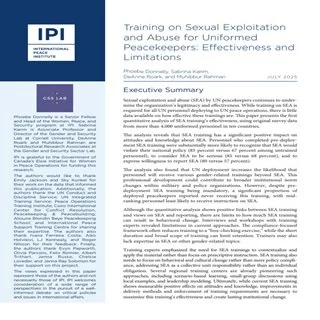By Phoebe Donnelly, Sabrina Karim, DeAnne Roark, and Muhibbur Rahman
Sexual exploitation and abuse (SEA) by UN peacekeepers continues to undermine the organization’s legitimacy and effectiveness. While training on SEA is required for all UN personnel deploying to UN peace operations, there is little data available on how effective these trainings are. This paper presents the first quantitative analysis of SEA training’s effectiveness, using original survey data from more than 4,000 uniformed personnel in ten countries.
The analysis reveals that SEA training has a significant positive impact on attitudes and knowledge about SEA. Personnel who completed pre-deployment SEA training were substantially more likely to recognize that SEA would violate their national policy, to consider SEA to be serious, and to express willingness to report SEA. The analysis also found that UN deployment increases the likelihood that personnel will receive various gender-related trainings beyond SEA. However, despite pre-deployment SEA training being mandatory, a significant proportion of deployed peacekeepers reported never receiving this training.
Although the quantitative analysis shows positive links between SEA training and views on SEA and reporting, the paper also explores limitations in current approaches to SEA training. Interviews and workshops with training experts underscored the need for SEA trainings to contextualize and apply the material rather than focus on prescriptive instruction. SEA training also needs to focus on behavioral and cultural change rather than mere policy compliance. The paper concludes that while current SEA training shows measurable positive effects on attitudes and knowledge, improvements in delivery methods and enforcement of training requirements are necessary to maximize this training’s effectiveness and create lasting institutional change.
New York: International Peace Institute, 2025. 16p.



